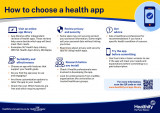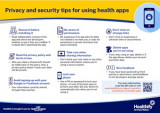If you're a frequent visitor to Healthify, why not share our site with a friend? Don't forget you can also browse Healthify without using your phone data.
App developers - guidance
App developers - guidance
- Are you developing or thinking of developing a health app? The following New Zealand and international resources may be helpful.

In New Zealand and internationally there is currently a lack of clear and accepted standards for the development (planning, requirement analysis and research, design and application testing) of apps for medical and healthcare use. This poses different challenges and risks to developers, providers, patients and the public. The following New Zealand and international resources provides some guidance on aspects to consider when developing mobile health apps.
Also see App evaluation models and assessment tools.
New Zealand resources
| Resource | Description |
| Guidance on evaluating or developing a health app [PDF, 434 KB] Health New Zealand | Te Whatu Ora |
An overview document that outlines key points to consider before deciding to develop a new health app. Read more [PDF, 434 KB]. |
| Apps guidance(external link) Privacy Commissioner |
This website provides developers with guidance on how to will handle information they collect and generate and also details how the Privacy Act applies to developers. Also see Making app privacy your advantage(external link). |
| Digital Health Strategy(external link) Health New Zealand | Te Whatu Ora |
The Health New Zealand | Te Whatu Ora is developing a Digital Health Strategy to guide the use of digital technologies in New Zealand's health system. Read more(external link) |
| NZ Digital Government(external link) New Zealand Government |
This website has information for government agencies, to support their digital transformation. It includes information on standards and guidance(external link). |
Other resources
| Resource | Description |
| HL7 Consumer Mobile Health Application Functional Framework (CMHAFF)(external link) HL7 Mobile Health Workgroup |
This framework is based on the lifecycle of an app, as experienced by an individual consumer, from first deciding to download an app, to determining what happens with consumer data after the app has been deleted from a smartphone. It is important to note that the Framework does not speak directly to the specific health or clinical functionality of an app but can be extended to do so through the use of profiles (with constraints and/or extensions) developed on top of cMHAFF. |
| Health Developer Network (external link)NHS, United Kingdom |
The NHS has a library of 'approved' health apps. To be included in the library, apps have to undergo a stringent review process. The Health developer network website(external link) has information and tools to help developers create software for health and social care. Also see Digital Assessment Questions [PDF, 888 KB] for sample assessment questions. |
| Evidence standards framework for digital technologies(external link) National Institute for Health and Care Excellence (NICE), United Kingdom |
This document outlines standards to make it easier for innovators and commissioners to understand what good levels of evidence for digital healthcare technologies look like, while meeting the needs of the health and care system, patients, and users. Read more(external link) |
| Guidelines for creating healthy living apps(external link) VicHealth, Australia |
This guide is for people interested in creating apps that improve the health and wellbeing outcomes for users. It is for both those new to developing apps with little software development knowledge, and those new to working in health promotion or behaviour change, and includes a useful checklist for developing an app. Read more(external link) |
| App development roadmap(external link) NHS Innovations South East, United Kingdom |
This provides basic, easy-to-follow guidance on app development and commercialisation of the app. Read more(external link) |
| Mobile medical applications(external link) FDA, United States |
This website provides information on mobile medical apps and the FDA's policy on the regulation of mobile medical apps. Read more(external link) |
| Mobile health apps interactive tool(external link) Federal Trade Commission, United States |
This information is targeted to app developers creating an app for use in the United States. It outlines the federal laws that apply. Although not largely applicable to New Zealand developers, it has some useful information on points to consider. Read more(external link) |
| Designing health literate mobile apps(external link) Institute of Medicine, United States |
This discussion paper describes how to apply both usability and health literacy strategies throughout the app development process. The authors describe a blend of health literacy and usability-improving strategies that can help developers build health literate apps, and include a case study in mHealth design from a 2012 mobile app challenge. Read more(external link) |
Co-design in health app development
Co-design is a method for partnering with patients, consumers and users right from the beginning of planning to ensure a closer alignment of what will work best for users. Read more about co-design. The following articles may give some insight into co-design in health app and online resource development:
- Ivana Nakarada-Kordic, Nick Hayes, Stephen D. Reay, et al. Co-designing for mental health: creative methods to engage young people experiencing psychosis.(external link) Design for Health. 2017 Oct 1(2): 229-44
- Verbiest M, Borrell S, Dalhousie S, et al. A Co-Designed, Culturally-Tailored mHealth Tool to Support Healthy Lifestyles in Māori and Pasifika Communities in New Zealand: Protocol for a Cluster Randomized Controlled Trial.(external link) JMIR Res Protoc. 2018 Aug 22;7(8):e10789.
- Hetrick SE, Robinson J, Burge E, et al. Youth Codesign of a Mobile Phone App to Facilitate Self-Monitoring and Management of Mood Symptoms in Young People With Major Depression, Suicidal Ideation, and Self-Harm.(external link) JMIR Ment Health. 2018 Jan 23;5(1):e9.
- Woods L, Cummings E, Duff J, Walker K. Design Thinking for mHealth Application Co-Design to Support Heart Failure Self-Management.(external link) Stud Health Technol Inform. 2017;241:97-102.
- Rajna Ogrin, Rekha Viswanathan,Tracy Aylen et al. Co-design of an evidence-based health education diabetes foot app to prevent serious foot complications: a feasibility study.(external link) Practical Diabetes 2018; 35(6): 203–209
Learn more
Magrabi F, Habli I, Sujan M, Wong D , et al. Why is it so difficult to govern mobile apps in healthcare?(external link) BMJ Health Care Inform. 2019 Nov
Van Velthoven MH, Smith J, Wells G, Brindley D. Digital health app development standards: a systematic review protocol.(external link) BMJ Open. 2018 Aug
Schnall R, Rojas M, Bakken S, et al. A user-centered model for designing consumer mobile health (mHealth) applications (apps).(external link) J Biomed Inform. 2016 Apr;60:243-51
How to design an award winning health app(external link) Australian Digital Health Agency
Resources
|
Disclaimer: The NZ Health App Library is a free consumer service to help you decide whether a health app would be suitable for you. Our review process is independent. We have no relationship with the app developers or companies and no responsibility for the service they provide. This means that if you have an issue with one of the apps we have reviewed, you will need to contact the app developer or company directly. |
Factsheets – using health apps safely

How to choose a health app
Healthify He Puna Waiora, NZ

Privacy and security tips for using health apps
Healthify He Puna Waiora, NZ
Last reviewed:
Page last updated:


